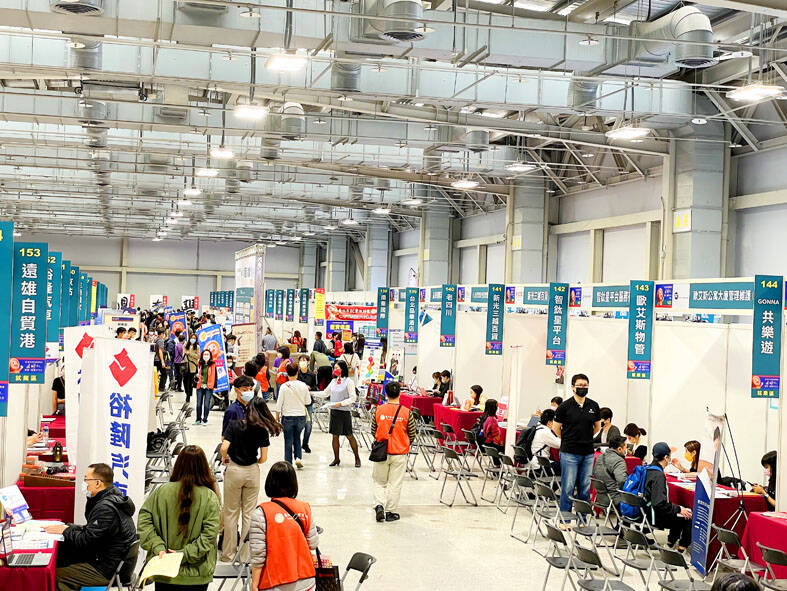Most jobseekers are interested in joining tech companies even though global technology titans are shedding headcounts to cope with a market downcycle, the online 1111 Job Bank (1111人力銀行) said yesterday.
The job bank said it made the observation after an internal survey found that 58.8 percent of respondents intend to work for tech companies and 14 percent have landed positions.
That means almost 73 percent favored jobs in the tech sector, with only 27.2 percent looking for occupations in other fields, the survey showed.

Photo: Tsai Ya-hua, Taipei Times
The results came even though global technology firms are downsizing payrolls and local companies in their supply chains are going through inventory corrections, it said.
High salaries and compensation packages were the main reason for the occupation preference at 72.3 percent, followed by better perks at 53.2 percent, a rosy outlook for the sector at 49.5 percent and expectations of year-end bonuses at 39.4 percent, it said, adding that upward mobility also played an important role at 19.1 percent.
The job preference appears unaffected by the fact that global technology firms laid off 168,582 people in the first quarter, more than for the whole of last year, 1111 Job Bank said.
Still, there are 674,000 vacant positions available in Taiwan, with 70,000 of them in the tech sector, a 16.6 percent advance compared with three months earlier, the job bank said.
The data show that demand for personnel remains strong in the technology industry, it said.

Taiwan Semiconductor Manufacturing Co (TSMC, 台積電) last week recorded an increase in the number of shareholders to the highest in almost eight months, despite its share price falling 3.38 percent from the previous week, Taiwan Stock Exchange data released on Saturday showed. As of Friday, TSMC had 1.88 million shareholders, the most since the week of April 25 and an increase of 31,870 from the previous week, the data showed. The number of shareholders jumped despite a drop of NT$50 (US$1.59), or 3.38 percent, in TSMC’s share price from a week earlier to NT$1,430, as investors took profits from their earlier gains

In a high-security Shenzhen laboratory, Chinese scientists have built what Washington has spent years trying to prevent: a prototype of a machine capable of producing the cutting-edge semiconductor chips that power artificial intelligence (AI), smartphones and weapons central to Western military dominance, Reuters has learned. Completed early this year and undergoing testing, the prototype fills nearly an entire factory floor. It was built by a team of former engineers from Dutch semiconductor giant ASML who reverse-engineered the company’s extreme ultraviolet lithography (EUV) machines, according to two people with knowledge of the project. EUV machines sit at the heart of a technological Cold

Taiwan’s long-term economic competitiveness will hinge not only on national champions like Taiwan Semiconductor Manufacturing Co. (TSMC, 台積電) but also on the widespread adoption of artificial intelligence (AI) and other emerging technologies, a US-based scholar has said. At a lecture in Taipei on Tuesday, Jeffrey Ding, assistant professor of political science at the George Washington University and author of "Technology and the Rise of Great Powers," argued that historical experience shows that general-purpose technologies (GPTs) — such as electricity, computers and now AI — shape long-term economic advantages through their diffusion across the broader economy. "What really matters is not who pioneers

TAIWAN VALUE CHAIN: Foxtron is to fully own Luxgen following the transaction and it plans to launch a new electric model, the Foxtron Bria, in Taiwan next year Yulon Motor Co (裕隆汽車) yesterday said that its board of directors approved the disposal of its electric vehicle (EV) unit, Luxgen Motor Co (納智捷汽車), to Foxtron Vehicle Technologies Co (鴻華先進) for NT$787.6 million (US$24.98 million). Foxtron, a half-half joint venture between Yulon affiliate Hua-Chuang Automobile Information Technical Center Co (華創車電) and Hon Hai Precision Industry Co (鴻海精密), expects to wrap up the deal in the first quarter of next year. Foxtron would fully own Luxgen following the transaction, including five car distributing companies, outlets and all employees. The deal is subject to the approval of the Fair Trade Commission, Foxtron said. “Foxtron will be